Survey of Community Relations Officers
Detailed Results
Part A : General
Part A: Highlights
- Half of the CROs who participated in the 40th General Election and answered the survey were assigned to the youth community (52%), 29% were asked to work with Aboriginal communities as a target population, 27% worked with the homeless and 9% among other target population notably homeless electors.
- On average, CROs worked 20 hours before the election, 12 hours the day of the election and 75 hours in total during the election period.
- More than half of those surveyed (58%) also worked other positions during the election namely Poll Clerk (24%), Central Poll Supervisor (22%), DRO (20%), Office Clerk (15%) and Revising Agent (13%).
- Generally speaking, three-quarters of the CROs surveyed (73%) spent most of their time in the field, while one in five respondents spent as much time in the field as in the office.
- For the most part, the CRO's supervision was ensured by the RO (72%) or the ARO (26%).
- One-third of the CROs encountered some problems in assuming their role. Among which the lack of adequate material (19%), problems with or contacting student administrators or associations (12%), tight deadlines (8%), lack of interest among electors (8%) and lack of clarity for their position (8%).
- As a whole, the CRO job description reflected the duties undertaken (85%). The RO was clear in conveying the CRO responsibilities upon the initial hiring process (84%).
- Most CROs felt like an important member of Elections Canada (79%).
- ROs were not as clear as during the last election with regards to instructing CROs not to contact any media (77%).
- Less than one in five CROs had a change in their responsibilities during their assignment.
Groups CROs Worked With
- More than half of the CROs surveyed (52%) worked with the Youth community, 29% of them worked with the Aboriginal community, 27% with ethno-cultural communities and 9% of them did some work with homeless electors.
- These results are similar to the 39th General Election. There is, however, one exception the proportion of CROs who worked with Aboriginal communities has decreased significantly in comparison to the 39th General Election held in 2006 (-13%).
- A greater percentage of respondents from the Prairies worked with Aboriginal communities (50%). In Quebec, 67% of the CROs surveyed indicated having worked with the Youth community, while a statistically higher proportion of Ontario CROs worked with ethno-cultural communities (44%).
Q1A. For which type(s) of target population(s) did you work as a community relations officer? (n=219)

Hours Worked as CRO Before and During the Election
- More than two-thirds of the CROs (68%) did not work before the election period. One-quarter of them worked 20 hours or less and 7% of the CROS worked more than 20 hours. On average, CROs who worked before the election period allocated 20 hours of their time.
- During the actual election period, 16% of the CROs did not work. The majority of them spent 71 to 100 hours working during the election (37%). On average, respondents worked 75 hours or 63 hours if we include those who did not work during the election period.
Q2. How many hours did you work before the election period? (n=219)
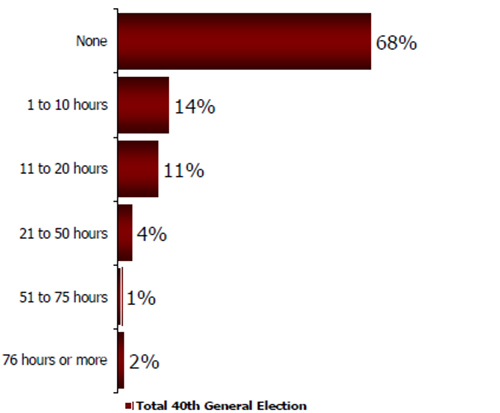
Q3. How many hours did you work during the election period? (n=219)
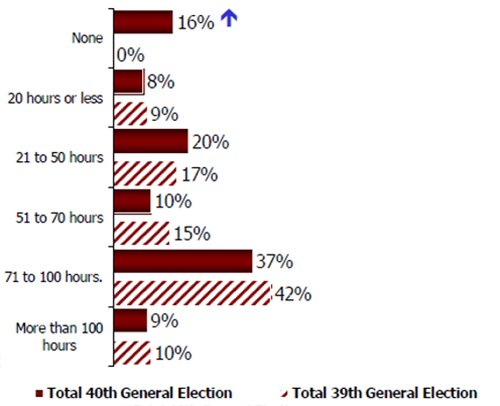
Hours Worked as CRO on Election Day
- On election day, respondents worked 12 hours on average during the course of the day. One in five respondents (20%) worked 11 to 15 hours, while half of them (52%) did not work.
- There is a statistical increase in the percentage of respondents who worked 16 hours or more (+9%).
Q4. How many hours did you work on election day (October 14, 2008)? (n=219)
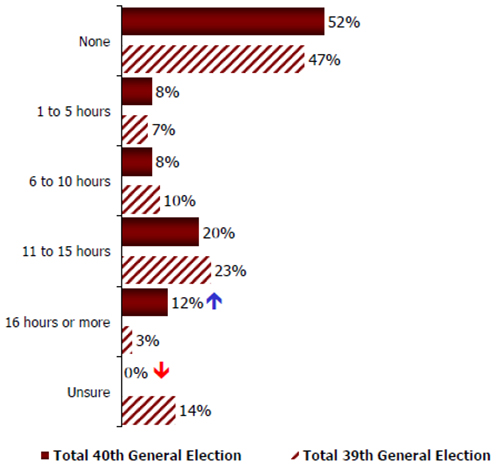
Other Positions Occupied by the CRO
- Nearly six out of ten CROs (58%) also worked another position during the election. This indicates a statistical increase in the percentage of CROs who also assumed another position.
- There's a significant increase in the percentage of CROs who assumed another position. For example, the percentage of respondents who acted as poll clerks as gone up from 3% in 2006 to 24% in 2008. The ratio of Central Poll Supervisors has increased from 8% to 22%. The proportion of DROs has doubled (20% vs. 10%), while the proportion of Office Clerks has moved from 0% to 15% and the percentage of Revising Agents has also gone from nil to 13%.
- On average, respondents worked 30 hours in other positions.
- In sum, not only were CROs asked to assume another position, they also filled positions that CROs did not assume during the 39th General Election.
Q5. Did you work in a position other than community relations officer during the election? (n=217)
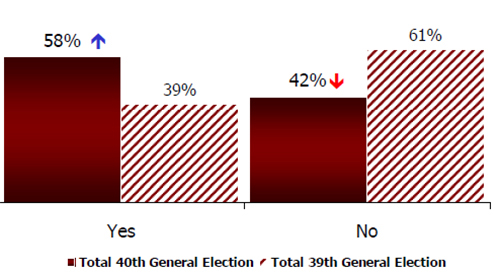
Base : Respondents who worked other positions than CRO
Q6. Specify for which position you worked: (n=119)
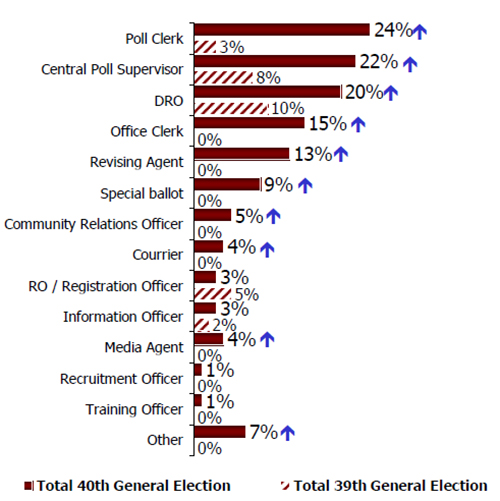
Defining Time Spent
- Nearly three-quarters of the CROs surveyed (73%) indicated that they spent most of their time in the field, a statistical increase in comparison to the last election (+10%).
- One in five CROs (21%) mentioned that they spent as much time in the office as in the field, while 4% of them spent most of the time in the office of the RO or the AARO. This ratio is statistically higher in Ontario (10%)
Q7. As a community relations officer, how did you manage your time? (n=216)
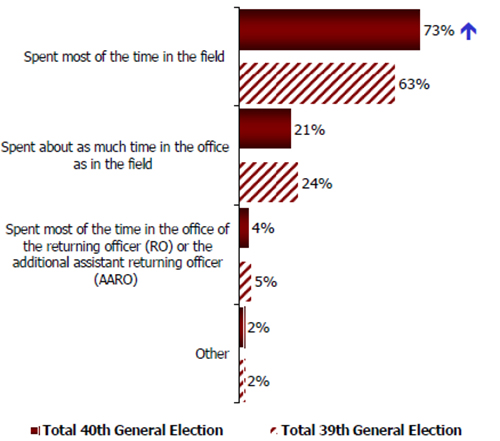
Main Supervisor of Work
- The main person who supervised the CRO's work is the Returning Officer (RO) (72%) followed by the ARO (26%). The increase in the percentage of CROs supervised by the ARO is a statistical one (+15%). A small percentage of CROs were supervised by the AARO (2%) or by another officer (2%).
- A greater proportion of experienced CROs (82%) mentioned having been supervised mainly by the RO. Conversely, new CROs (38%) and Quebec respondents (45%) are more numerous, in proportion, to say that the main supervisor of their work was the ARO.
Q8. Who was the main person who supervised your work as a community relations officer? (n=217)
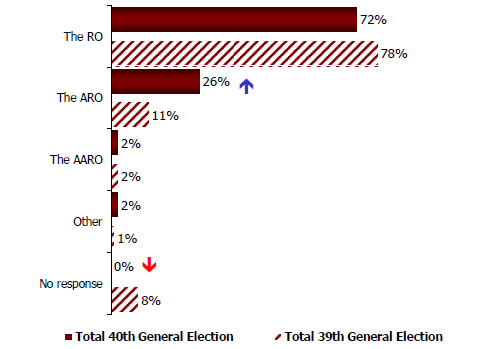
Problems Encountered as a CRO
- One-third of the CROs (32%) indicated having experienced some difficulties in exercising their role. This is a significant increase in comparison to the last election where one-quarter of them had experienced some difficulties.
- Although not statistically significant due to the small sample size, a greater proportion of respondents from Alberta (54%), Manitoba (46%), Nova Scotia (40%) and Newfoundland (40%) mentioned having had some difficulties exercising their role.
- The major problems encountered revolve around inadequate material or material arriving late (19%), problems contacting schools or student associations (12%), tight deadlines (8%), lack of interest among young voters (8%) and a lack of clarity in the role of CRO (8%).
Q9. Did you have any difficulties in exercising your role as a community relations officer? (n=217)
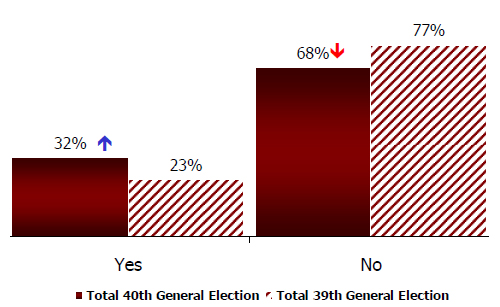
| Total 40th General Election | |
|---|---|
| Lack of adequate material (need more student-oriented material, smaller posters) / Late arrival of material | 19% |
| Problems with contacting school administrators or students associations | 12% |
| Tight deadlines | 8% |
| Lack of interest, especially Young people | 8% |
| Lack of clarity in their role of CRO | 8% |
| Communication problems with Elections Canada or other hired EC employees | 5% |
| Problems with contact lists | 5% |
| Difficulties in pursuing some outreach activities | 4% |
| First Nations reserve wanted their own election poll / Had to vote outside the territory | 4% |
| Problems with Aboriginal communities (lack of trust, communication) | 4% |
| Difficulties reaching target groups (homeless, ethno-cultural communities) | 4% |
| Time management constraints (school, work, etc.) | 3% |
| Other | 15% |
Role, Responsibilities and Overall Attitude : Level of Agreement
- Overall, 85% of the CROs felt that the job description accurately reflected their duties as a CRO. This ratio climbs to 93% in Quebec.
- More than eight out of ten CROs (84%) would agree that their RO clearly outlined what their responsibilities would be.
- Most CROs felt like an important member of Election Canada (79%).
- Three-quarters of the CROs (77%) were instructed by the RO not to contact any media or media agencies. This percentage is a statistical decrease in comparison to the last election.
- Less than one in five CROs (16%) indicated that their responsibilities changed during the course of their assignment. Although not statistically significant, it would seem that a greater percentage of CROs from PEI and New Brunswick saw their responsibilities change during their assignment.
| Total 40th General Election AVERAGE SCORE OUT OF 5 |
Total 40th General Election SUM OF AGREE & STRONGLY AGREE |
Total 39th General Election SUM OF AGREE & STRONGLY AGREE |
|
|---|---|---|---|
| Q11. The job description accurately reflected your duties as a community relations officer. | 4.26 | 85% | 80% |
| Q12. Your RO clearly outlined your responsibilities as a community relations officer when you were hired. | 4.37 | 84% | 89% |
| Q15. As a community relations officer, you felt like an important member of Elections Canada | 4.27 | 79% | 82% |
| Q14. Your RO instructed you not to contact any media or media agencies. | 4.13 | 77%  |
93% |
| Q13. Your responsibilities as a community relations officer were changed during your assignment. | 1.89 | 16% | 18% |
